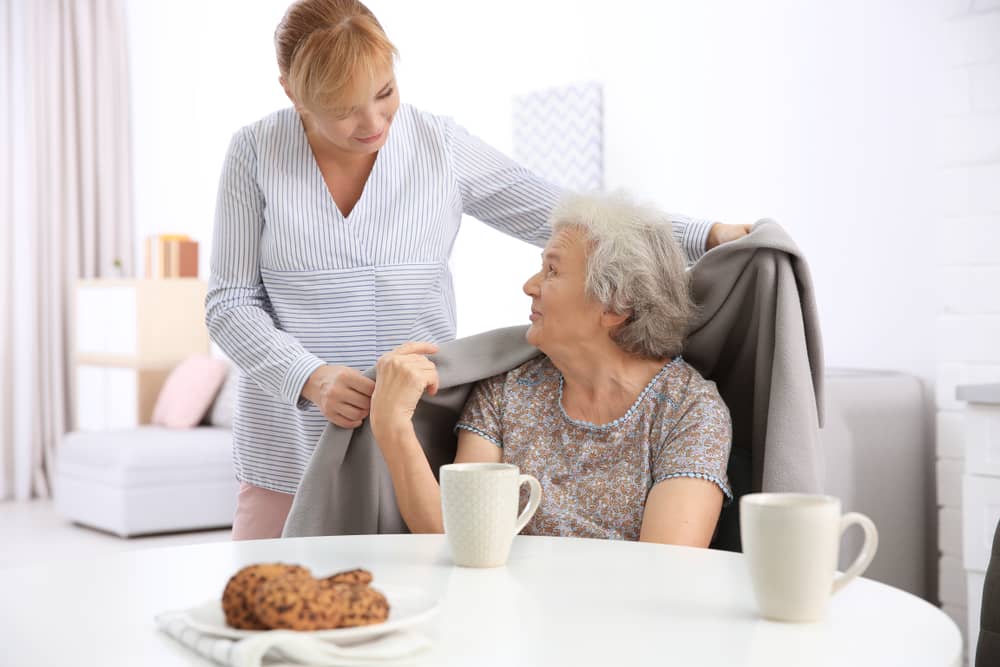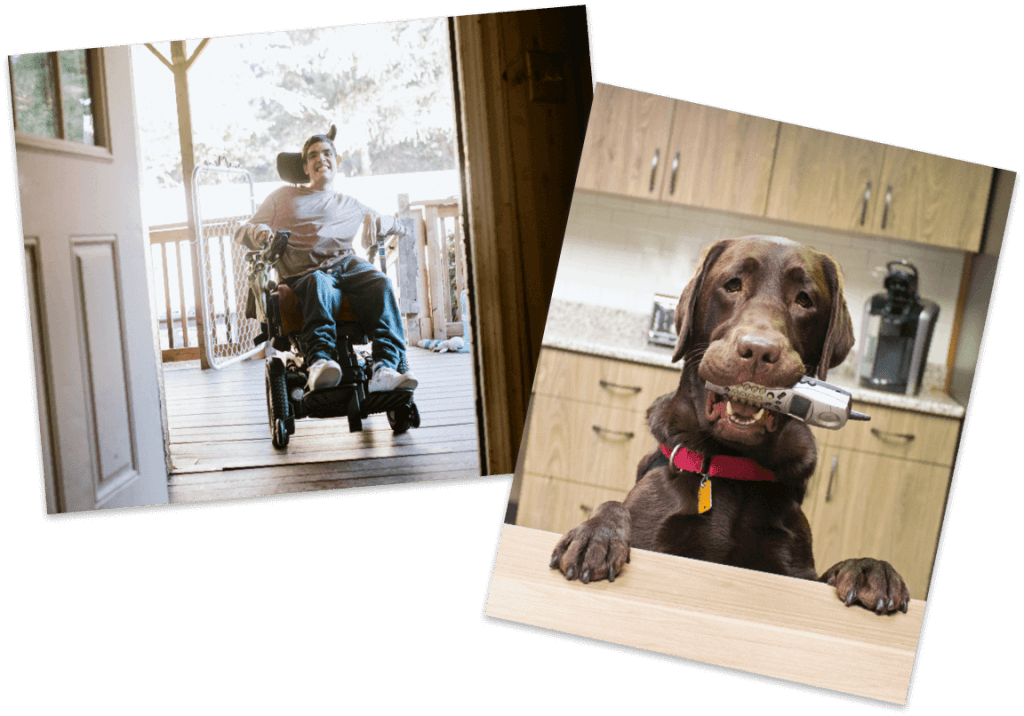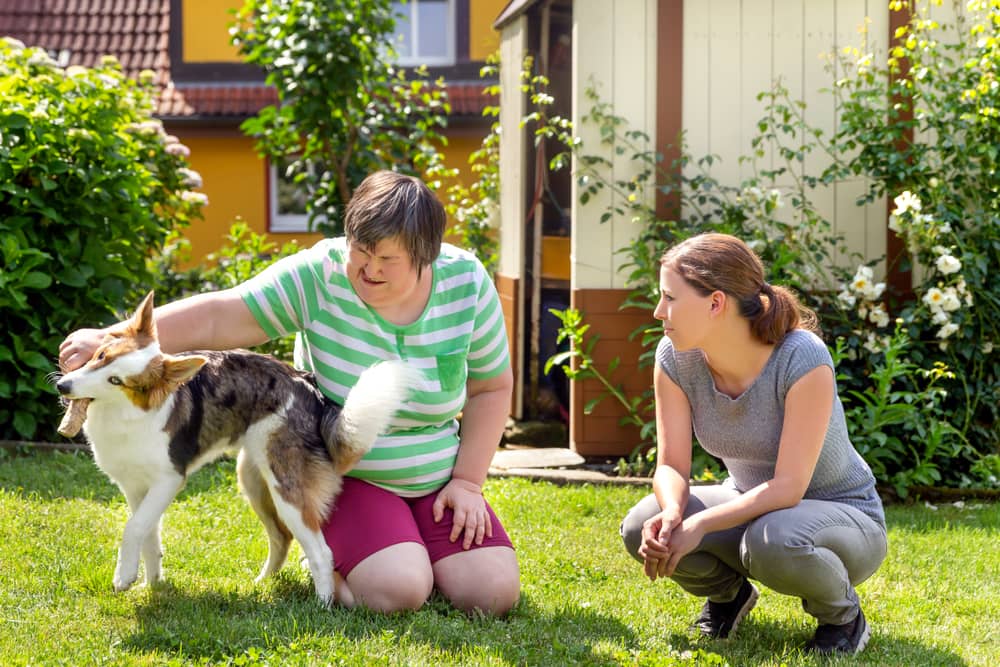As the older population continues to expand, the demand for caregivers grows exponentially. Rather than moving into a retirement community or group home, many seniors and people with disabilities opt to live in the comfort of their own homes.
For many people, living a fulfilling life at home requires in-home skilled care, which can be medical or non-medical in nature. If you’ve ever asked yourself, “why be a caregiver?”, this blog is the perfect place to start. Let’s start by defining the role of a caregiver and the services they provide for clients.
What is An In-Home Non-Medical Caregiver?
In-home caregivers assist seniors, people with disabilities, and individuals recovering from injuries or illnesses with activities of daily living (ADLs). In other words, they help those facing physical and/or mental challenges live more fulfilling, independent lives in their homes and communities.
Some caregivers also provide personal care services to individuals in assisted living facilities, retirement communities, and skilled nursing facilities. It’s important to understand that in-home caregivers do not live in their client’s home. Instead, they visit clients on a regular basis (daily or weekly) and assist them with ADLs and other tasks.
In some cases, family members (such as adult children) care for their elderly parents or relatives with disabilities. However, the responsibilities of caring for loved ones can be overwhelming, stressful, and lead to strained relationships. Professional caregivers provide specialized, experienced care that brings families valuable peace of mind.

Services Provided By In-Home Non-Medical Caregivers
In-home caregivers provide a variety of services for people who want to live more independently in their own homes. This includes (but is not limited to) the following:
- Companionship. Caregivers spend time with their clients and build relationships with them. This can boost their overall well-being and improve relationships with family and friends.
- Light housekeeping. This includes things like taking out the trash, doing laundry, vacuuming, and cleaning the kitchen and bathroom(s).
- Meal preparation. Caregivers are responsible for ensuring their clients receive the nutrition they need to stay healthy.
- Medication reminders. One of a caregiver’s most important jobs is making sure their clients take the right dosage(s) of their medication(s) at the right time(s).
- Personal care. This includes things like assistance with bathing, toileting, personal hygiene, grooming, and dressing/undressing.

UDS Can Help You Live A Fuller Life With Our Comprehensive Services:
Planning & Support – Our dedicated planning & support teams help manage the care and services you need.
Personal Care & Independence – We’ve helped people with disabilities live more independently in their own homes since 1965.
Enrichment & Life Skills – Our variety of programs is dedicated to building skills for living well with a disability.
What Skills Are Needed to Be a Caregiver?
Wondering how to be a caregiver for the elderly or people with disabilities? The majority of skills required to be an in-home caregiver are not technical in nature. Instead, you’ll need a desire to help others and a passion for spending time around people. Let’s take a closer look at the soft skills necessary to provide the highest levels of care at home.
Selflessness & Empathy
Selflessness, empathy, and compassion are perhaps the most important aspects of being an in-home caregiver. Always put the client first and think of how you can elevate their quality of life. The best caregivers form personal relationships with their clients and are invested in their well-being not because they have to be, but because they want to be.
Patience & Tolerance
The best in-home caregivers possess patience, tolerance, and understanding. Dealing with seniors can be difficult due to the effects of aging, and clients with disabilities may become frustrated easily. Demonstrating empathy while remaining calm and patient allows you to provide care that eases any stress your clients may be experiencing.
Friendliness
While it almost goes without saying, an in-home caregiver should also be a friendly, outgoing “people person.” You’ll be interacting with clients for much of the day, so it’s crucial to enjoy one-on-one interactions with others.

Trustworthiness & Reliability
Being an in-home caregiver also requires high levels of reliability and trustworthiness. Your clients are depending on you to assist them with everyday activities where and when they need you. And because they’re inviting you into their home, it’s crucial that you’re honest and trustworthy.
Good Communication Skills
Caring for seniors and people with disabilities requires finely-honed communication skills. Your clients may have trouble expressing their feelings, so it’s crucial that you pay attention to other cues. You’ll also need to listen carefully to what they say, pay close attention to what they do, and act respectfully in their best interests.
Organization & Time Management
Staying organized and paying attention to the little things is also crucial to being a caregiver. This is especially important if your client experiences some sort of emergency. You’ll also need to have good time management skills since you’re essentially your own boss. Prioritizing tasks and making sure everything is completed by the end of your shift ensures that your clients are well taken care of.
Flexibility
The final important soft skill you’ll need to be an in-home caregiver is flexibility. No two clients are the same, and their needs can change on a daily basis. Staying flexible and prepared for sudden changes ensures you’re ready to handle any challenge that comes your way.
Benefits of Being a Caregiver
There are many benefits of being an in-home non-medical caregiver for seniors, people with disabilities, and individuals recovering from illnesses or injuries. We’ll answer the question, “why be a caregiver?” in the following section.
Rewarding & Satisfying Career
Taking care of those who need it most is extremely rewarding and can provide you with a sense of fulfillment and purpose. You can be proud of the work you’re doing by truly making a difference in the lives of others and the world at large. Nothing feels better than seeing your clients smile and knowing you’re having a positive impact on their mental and emotional health.
Caregiving also provides the satisfaction of making an impact that’s far more important than furthering someone’s business interests. You’ll see the tangible effects of your work on a daily basis and know that you’ve lessened the burden on people living with significant challenges. And you’re giving back to the larger community by enriching it with people who may otherwise be excluded.

Active Job with a Variety of Tasks
If you like doing different tasks during the day and don’t want to be tied to a desk, caregiving is an ideal career. You’ll never have the same day twice, and you’ll benefit from the opportunity to develop new skills, techniques, and practices. Ultimately, caregiving keeps you on your toes and allows you to build connections across many different circumstances.
Opportunities for Growth
Caregiving also provides a variety of opportunities for personal and professional growth on the job. You’ll improve your self-confidence and sense of self-worth by making decisions that significantly impact the lives of other people. And listening to your client’s needs can help you boost your interpersonal skills both within and beyond the workplace.
Valuable Respite for Families
In some cases, family members take on the responsibility of caring for aging parents or loved ones with disabilities. This can be exhausting, frustrating, and often leads to caregiver burnout. Stepping in and giving tired relatives a break can be very rewarding and helps you bond with your client’s family. Knowing their loved ones are well cared for also provides peace of mind for adult children and frees up more time for them to focus on their other responsibilities.
Flexible Schedule & Independence
Another benefit of being an in-home caregiver is a flexible schedule and the independence to manage your own schedule. You’ll enjoy flexible hours that work around your family and responsibilities in a comfortable environment that’s essentially like working from home.
These benefits are only scratch the surface of being an in-home caregiver but despite these benefits, there is currently a caregiver shortage in the US since the onset of COVID-19.
Do You Need Certifications to Be a Caregiver?
In most cases, in-home non-medical caregivers don’t need many professional or technical certifications. However, this varies based on a state-by-state basis. Regardless, you won’t be expected to know everything upfront, and you’ll have the opportunity to develop new skills on the job. Most agencies require a background check, drug screening, and transportation verification, though.

Learn About In-Home Personal Care Services from UDS
Independent Living Services (ILS) is a division of Accessing Independence, which is a UDS Foundation company. ILS has over 25 years of experience providing vital in-home, non-medical personal care for seniors and people with disabilities.
At ILS, our goal is to provide high-quality at-home care that enhances independence and enriches lives. We also offer personal care services for individuals in retirement homes, assisted living communities, and skilled nursing facilities.
Who Can Benefit from In-Home Personal Care?
A wide range of people can benefit from our compassionate in-home personal care, including:
- Individuals with disabilities
- People suffering from chronic illnesses
- Seniors looking for companionship
- People recovering from surgery
- Primary caregivers seeking respite
Services We Provide
Independent Living Services caregivers provide their clients with a variety of services, such as:
- Ambulation and transfer assistance
- Appointment escorts (doctors, dentists, therapy, rehabilitation, etc.)
- Assistance with bathing, toileting, grooming, and dressing
- Errands and transportation
- Companionship (reading aloud, playing games, chatting, etc.)
- Light housekeeping (cleaning, yard work, laundry, etc.)
- Medication reminders
- Meal preparation
Becoming an ILS Caregiver
If you’re looking for a rewarding career that allows you to make a difference in the lives of others, consider becoming an ILS caregiver. There are many benefits to joining our team, including:
- Flexible, part-time schedule
- Competitive wages
- Opportunity to participate in a 401(k)
- Ability to care for family members
- Paid initial orientation training on how to be a caregiver
- Paid optional quarterly/ongoing training
- Opportunities for career advancement
- On-staff Safety Mentor to handle questions or concerns